The Rise of Smart Home Technology in
Home Theaters

Smart home technology is revolutionizing how we use our living spaces, providing more convenience for daily tasks around the house.
Now that films are being released on both streaming platforms and at the cinema, home theatres are becoming more popular. With smart technologies, you can create an immersive entertainment space for a captivating watching experience.
Smart devices provide exceptional audio and visual experiences, seamless automation, voice activation, and other custom settings.

Keep reading as this article discusses the rise of smart home technology – and what this means for your at-home viewing experience.
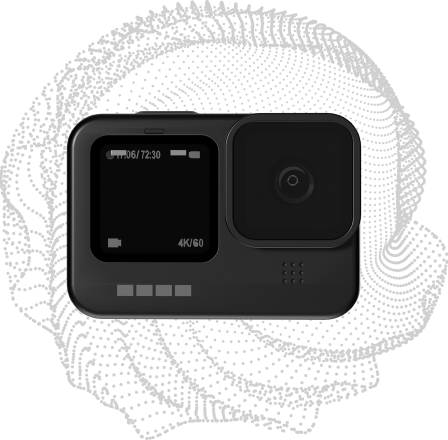
Understanding
Smart Home Technology
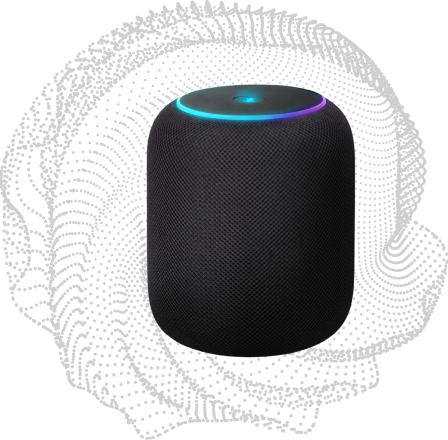
Smart home devices are devices we use daily around our home, which are connected to the internet to allow more automation – for instance, you might be able to use voice commands or use your phone to control technology around your home.
Smart home devices make your home more accessible and convenient while ensuring energy efficiency and security. To help you understand the value of smart devices for your home management, here are some of the top examples of smart home devices.
Smart Speakers
Smart speakers, like Amazon Echo with Alexa or Google Home, are virtual assistants that respond to your voice commands.
You can ask them to play music, provide updates on the weather, answer questions, control other smart devices, and more.
Control your
smart device.
Play music
with voice
Virtual
assistant

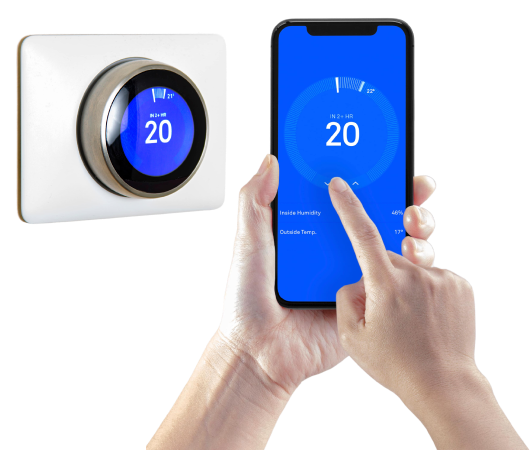
Temperature
Check from mobile
Control with
voice commands.
Smart on
and off
Smart Thermostats
A smart thermostat allows you to check your home’s temperature from anywhere using your mobile device or an app. You can also control your thermostat using voice commands.
Some smart thermostats will base your heating and cooling off your behaviors and daily habits to help you conserve energy.
Smart Lighting
Home theater smart lighting includes devices like Philips Hue or LIFX smart bulbs. You can control these bulbs using your mobile device, using voice commands, or using an app.
You can change the color of your lights, dim them, or schedule them. You can even integrate them with other devices, like your smart door locks, to ensure your home is lit when you walk through the door.
Control using
voice commands
Control
using an app
Change the
light color,
brightness
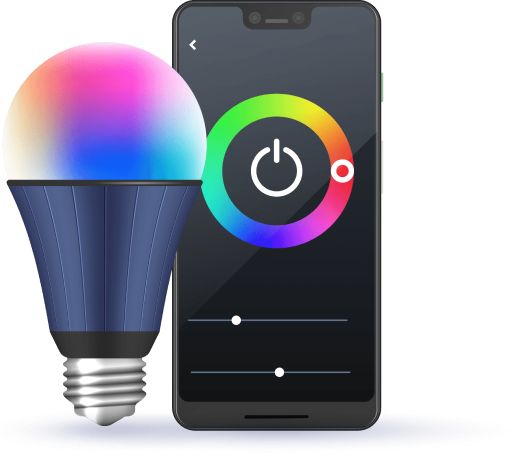
Smart Security Cameras
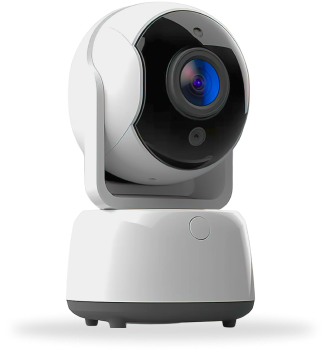
You can also communicate through the cameras to instruct delivery drivers where to leave your packages. And you can do all of this using a mobile application.
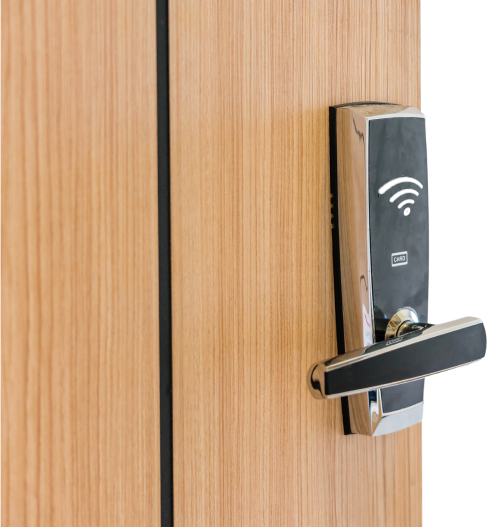
Remotely
operable
Integration with
other home systems
voice commands
to lock
Smart Locks
Smart locks are a convenient and remotely operable locking solution for your home.
Smart door locks like August or Schlage allow keyless entry, remote unlocking, and integration with other home systems – for instance, you might use facial recognition software, smart door locks, and smart security cameras together for airtight security.
You can also use voice commands to lock your doors remotely from inside your home.
Smart Entertainment Systems
Smart TVs, streaming devices, sound systems, and other smart entertainment systems can connect with your virtual assistant for voice command controls and more immersive viewing experiences.
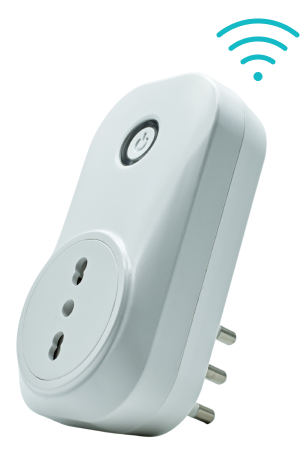
Remotely control
power supply
Energy
efficiency
Control your
radio or lamps
Benefits of Incorporating Smart Home Technology in Home Theaters
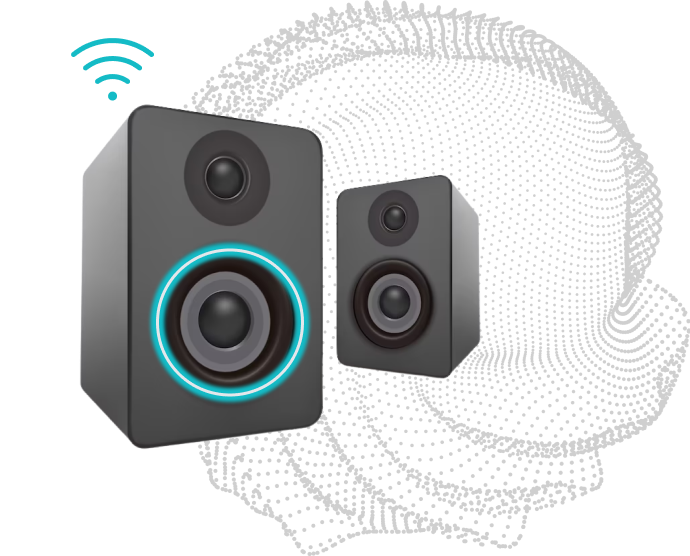
Why should you incorporate smart home technology with your home theater? Let’s take a look at the advantages.
Seamless Control and Automation
Smart home technology gives you more control over your home theatre viewing experience.
You can use a smartphone app to control the lighting in the room, improving your view of the screen.
Or, you might control the picture to make it clearer, adjusting the brightness, temperature, and audio settings. You can seamlessly create a perfectly customized viewing experience by controlling this with your mobile device or voice commands.
Voice Control and Convenience
You can integrate your home theatre system with your home’s virtual assistant – such as Alexa or Google Home – to enable voice control.
You can pause your film, lower the volume, and change channels without a remote. This adds much more convenience to your viewing experience, allowing you to control your TV without leaving your seat to find a remote.
Personalized Settings and Customization
Smart home technology allows you to create personalized settings that align with your preferences. You can save settings, such as audio and visual settings, equalizer presets, lighting scenes, and display preferences. This way, your movie-watching experience is always tailored to your environment.
Energy-Efficiency and Cost-Savings
When you use smart devices, you can ensure your home theater is energy efficient.
You can adjust settings to ensure your theater is not heated when not in use.
You can also automate the dimming or switching off lights when your film starts. With this automation, you can make significant energy savings over time.
Enhanced Video and Audio Performance
Each room has its brightness and acoustics. With smart home technology, you can provide details regarding your home’s acoustics and lighting to optimize the entertainment system. Smart projectors and screens will adjust the brightness level to enhance visibility and aspect ratio settings, ensuring a perfect viewing experience.
Some homeowners prefer a concealed audio speaker set, while others prefer designer acoustic elements and attractive speaker setups for stylish interior design. By integrating your speaker system with your smart screen, you can reduce the need for wires and ensure seamless connectivity for the ultimate viewing experience.
Integration with Streaming Services and Content
In the past, people have used HDMI cables and complex setups to connect their favorite streaming services with their home theater setups. With smart home theater systems, you can access your favorite streaming services directly for more convenience, eliminating the need to purchase cables and other complicated pieces of equipment.
Remote Access and Monitoring
A smart home theater lets you control and monitor your devices from anywhere. You can ensure your devices are switched off when you leave the house or switch them on before arriving home to create the perfect ambiance. This feature gives you peace of mind regarding your home theater system and creates more flexibility.
Improved Gaming Experiences
Integrating your sound system, mic setup, and smart screen can improve your gaming experience. Smart screens allow you to improve screen quality and audio performance for a more immersive gaming experience. You can use voice commands to switch to your gaming console input remotely and use virtual reality with wireless connectivity. With smart technologies, you can completely enhance and elevate your gaming experience.
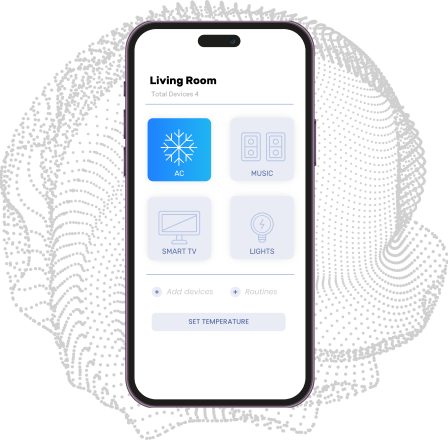
The Integration of
Smart Home Technology
in Home Theaters
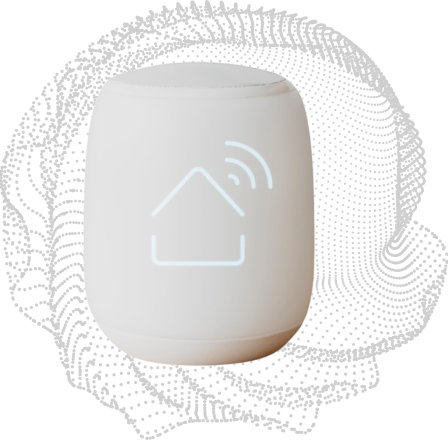
Smart home technology enhances and transforms how we experience and control our home entertainment. When you incorporate smart devices into your viewing experience, you can have more control, automation, and advanced features.
You can leverage connectivity to improve your overall viewing experience.
Below are some examples of the integrations you might make for your home theatre.
Voice Control and Virtual Assistants
With smart home technology, you can control your home theater using voice commands – eliminating the need for a remote.
Your Alexa or Google assistant can control your home theater technology with voice commands like ‘Alexa, turn on the TV’, or ‘Hey Google, turn the volume down on the TV’.
By integrating your virtual assistant with your home theater setup, you can control the settings on your TV, change inputs, lower the volume, or perform a search with your voice.
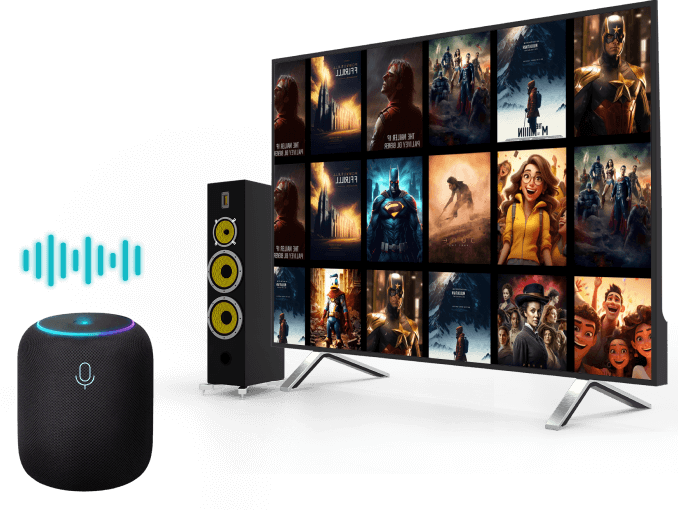
Automated Lighting and Ambiance
You can synchronize your lighting system with your home theater to create a more ambient and immersive experience.
By using smart devices for your lighting and home theater system, you can program your lights to dim when your viewing experience begins. You press play, and the atmosphere in the room adjusts to enhance your viewing experience. If this isn’t an option with your smart home devices, you can also use voice commands to ensure the ambiance aligns with the content your plan to watch.
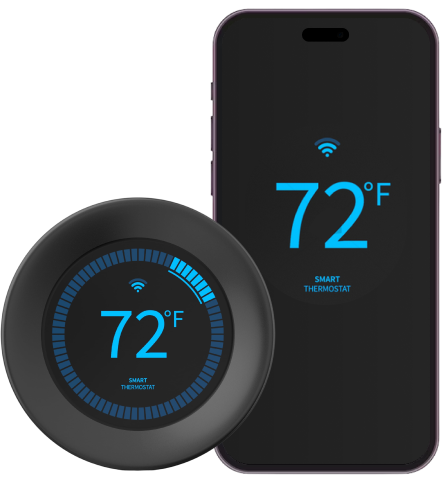
Smart
Thermostats and Climate Control
Comfort is essential to a great viewing experience. When you are sedentary for long periods, it is important to ensure the room is heated sufficiently, or your body temperature could drop. You can use smart thermostats to ensure the room is heated to the optimal temperature for your viewing experience.
And, when the home theatre room is unoccupied, you can ensure the thermostat automatically switches off. You can do this by integrating your smart TV or projector with your smart climate control, ensuring that turning on your entertainment device triggers the heating to switch on or off in your home theater.
Smart Blinds and Curtains
Natural light can be detrimental to your viewing experience. With a smart home entertainment system, you can ensure your smart blinds or curtains shut when you begin your viewing experience.
If you opt for smart blackout blinds, you can ensure your home theater feels as atmospheric as a public theater. You can use voice commands to close your blinds and curtains, or you can use integration to automate the process.
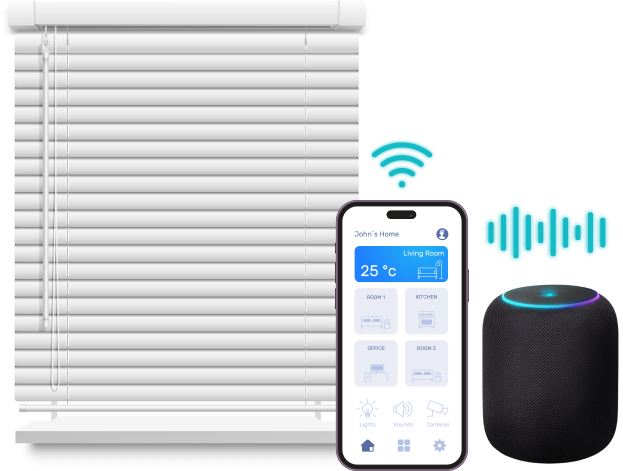
Smart Projectors
and Screens
Smart projectors and screens are designed to enhance your viewing experience by offering customizability for the following features:
Integration with
smart home
systems
Controlling projection
settings (brightness,
alignment)
Aspect ratios
Screen positioning
These customizable features improve your viewing experience by ensuring total visibility of the content picture. You can control these features using voice commands or a mobile application. Some smart projectors also enable you to access streaming platforms more conveniently.
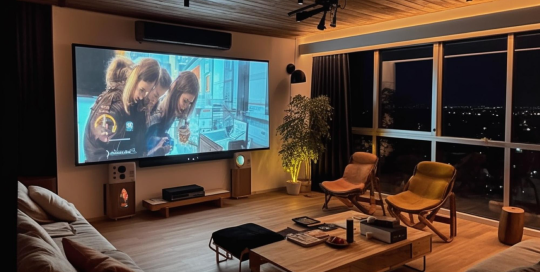
Multi-Device Integration
With smart home technology, you can integrate your smart home entertainment system with other devices in your home.
You can integrate smart TVs, streaming devices, sound systems, gaming consoles, and other devices. By integrating all of these devices, you can control them using a single interface, whether that be via voice commands or a mobile application.
By eliminating the need for many different remotes, you can also create a tidier home atmosphere, allowing you to store your remotes out of sight and use your phone to control your entertainment system.
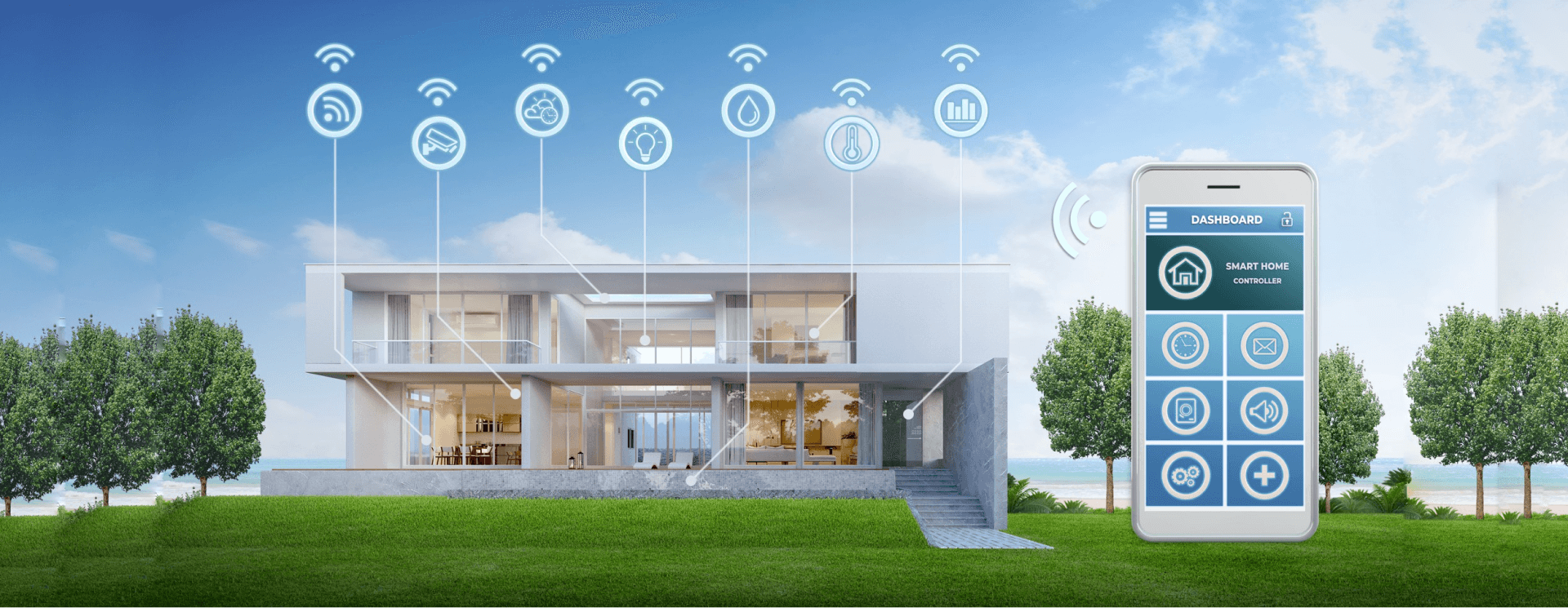
Smart Home Automation
You can incorporate your home theatre system with your smart home automation system. You can create custom routines or scenes to suit your activities. For instance, you might create a ‘reading ambiance’ scene with a fireplace projected onto your screen, the lights dimmed, and the heating turned up.
When you use the voice command to switch to the reading ambiance setting, your home will automatically adjust. For your home theater system, you can have a dedicated ‘movie night’ setting, which allows you to enjoy your viewing experience with the perfect iMAX ambiance – just like in a real cinema.
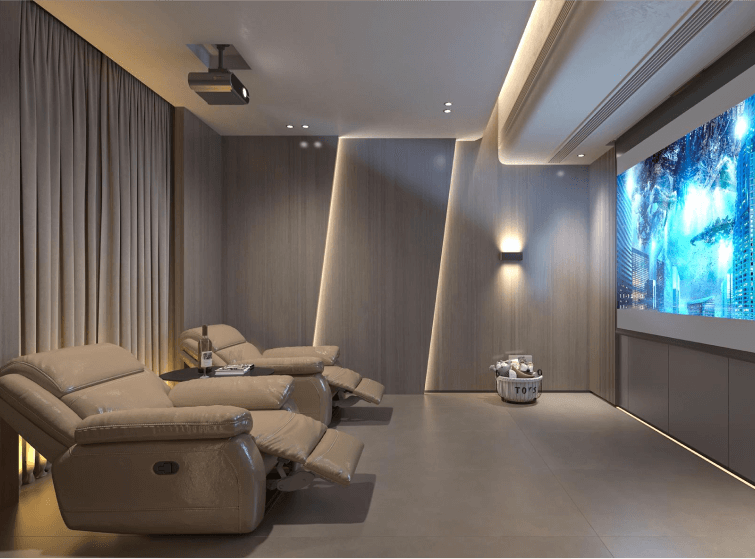
Enhanced User Experience with Smart Home Technology
The advanced features, custom options, and convenience offered with smart home technology allow you to enhance the user experience. Whether unifying your smart home controls on a single interface or creating automation for more efficiency, you can leverage smart technology in many ways.
Below are some of the best ways to use smart home technology to improve your home cinema experience.
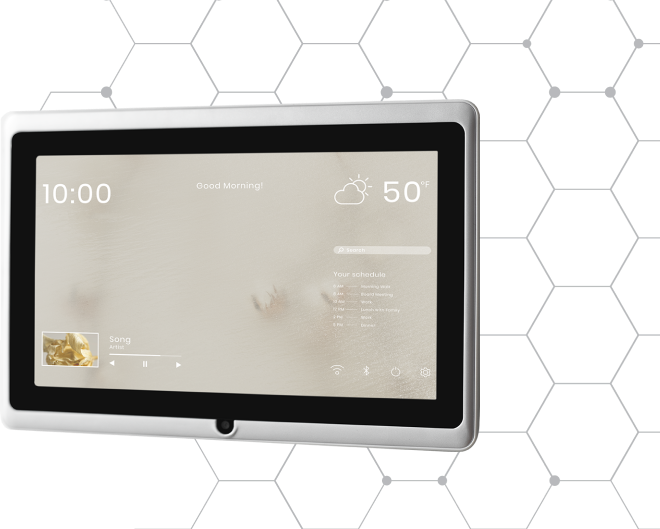
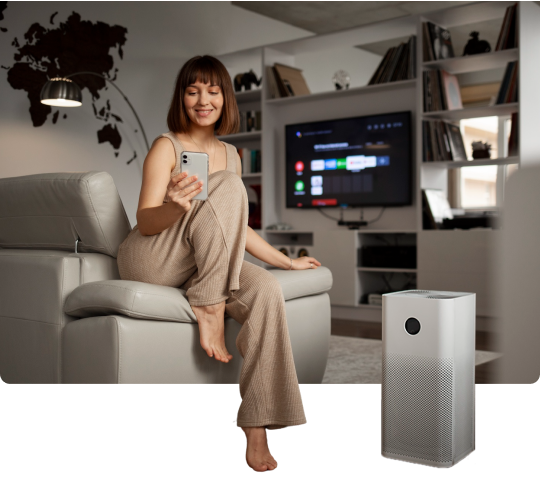
Seamless Connectivity and Synchronization
You can allow your devices to work together to create a perfect, harmonious viewing experience. You can connect smart speakers, lighting, and other devices with your smart entertainment system to ensure synchronized and optimized experience.
All the different components of your home theater system will work in unison to enhance the overall viewing or listening experience. Your speakers will be perfectly coordinated with the picture on the screen, and your lighting will adjust to the optimal brightness for your viewing pleasure.
Customized Settings and Personalization Options
A smart home system can empower you to control your viewing experience completely. You can adjust audio settings to ensure perfect surround sound or adjust the screen resolution and lighting levels. By honing your systems to your ideal viewing experience, you can ensure your unique tastes are met – maximizing your enjoyment.
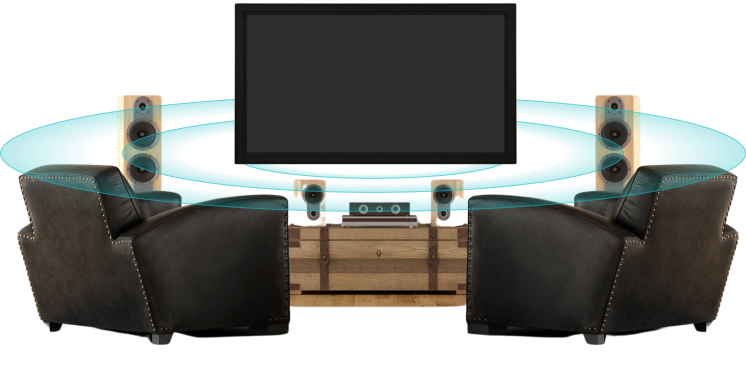
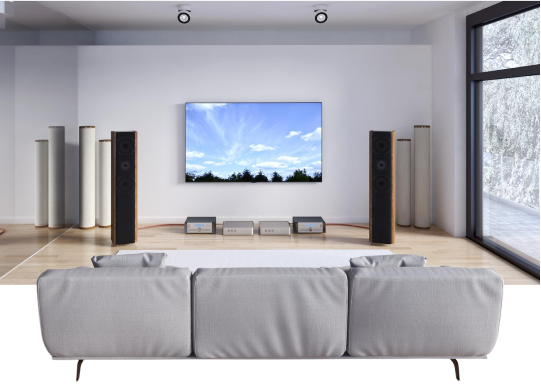
advanced
audio
processing
adjusting
acoustics of
your home
HDR image
optimization
algorithms
Enhanced Audio and Video Quality
A smart home theater system allows you to ensure optimal audio and video quality at all times.
You can incorporate advanced audio processing capabilities for immersive sound experiences, adjusting the settings to suit the acoustics of your home environment.
Or you can use features like high dynamic range (HDR) and image optimization algorithms to enhance the picture quality, color quality, and contrast displayed on your screen.
Smart Home Automation for
Convenience and Efficiency
Your smart home system can adapt to your routines to provide you with the perfect daily schedule, providing efficiency and convenience. For instance, you might ensure your home theater’s temperature and lighting automatically adjust when you switch on your smart TV or projector.
You might also preload content remotely to ensure immediate playback when you return home. By reducing the manual intervention required for home management, smart technology saves time and reduces hassle.
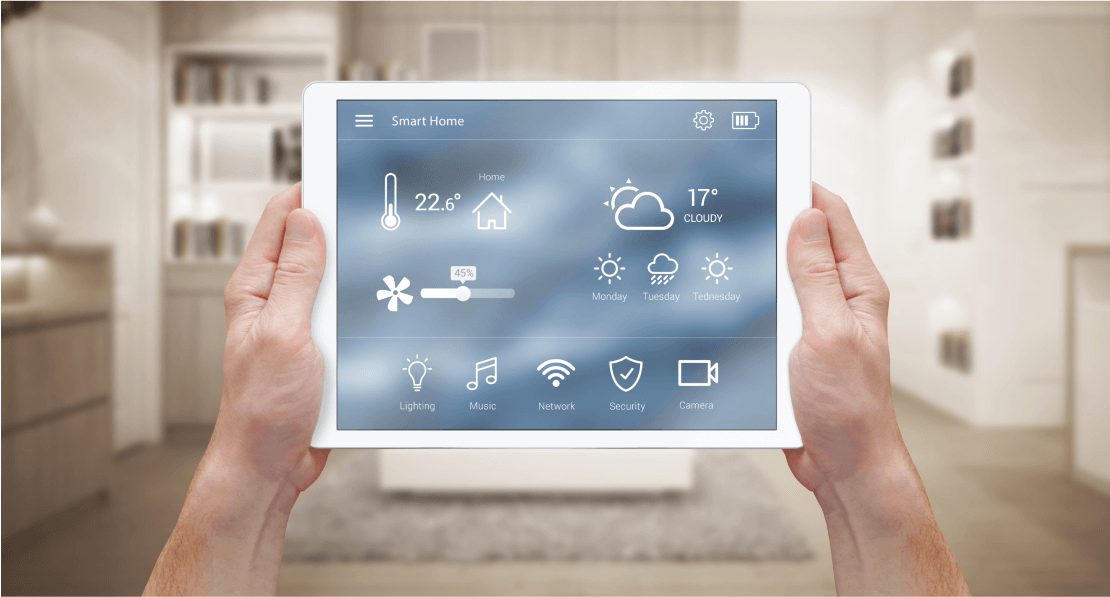
Smart Home
Security and
Privacy Concerns
Of course, security and privacy concerns exist with any smart or cloud-based device. Before investing in a smart home device, here are some security and privacy considerations you should make.

Data Privacy
Choosing reputable smart home devices helps to ensure data privacy. If you do not take care in selecting a trustworthy and reliable smart device, you could experience data breaches or unauthorized access.
Your smart home devices collect and store data about your activities, preferences, and usage patterns – which is why you need a reputable smart home device provider that will handle your data securely and responsibly.
Secure Network
When you connect your smart home devices to the internet, they become vulnerable to potential cyberattacks. If your home network is breached, your smart home devices could be targeted.
So, you must secure your network with strong passwords, perform regular updates for your device firmware, and set up a separate network for your smart devices to make them more difficult to access.
Updating your passwords regularly or investing in password management software will help you to avoid any potential security breaches or compromised passwords.
Device Vulnerabilities
Performing system updates as soon as they arise keeps your smart devices secure. When your provider issues an update, it often removes vulnerabilities present in older versions. If you are still using an outdated software version, your devices could be vulnerable.
Secure Authentication
If you use a weak password or single form of authentication, there is no other measure to prevent an unauthorized user from accessing your network of smart home devices. It helps to have more than one barrier to entry for your system.
To provide sufficient protection, you should use a two-factor authentication process, strong passwords, and access approval to ensure no third party can access your devices.


Malware And Ransomware
Antivirus software is an essential investment for those wishing to secure their smart home devices. Malware and ransomware can compromise the security and functionality of your system.
Downloading untrustworthy apps and files can increase the likelihood of a malware or ransomware attack – so take great care when downloading. To check your system for any malware or ransomware, you can use antivirus software to scan your devices.
Third-Party Integrations
You should take a diligent approach when reviewing any third-party integrations’ security and privacy policies for your smart home system. Ensure that any third-party integrations you apply to your system will responsibly store and protect your data.
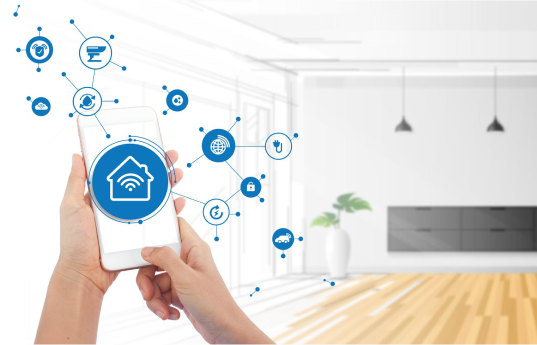
Guest Access
When visitors use your smart devices, it is essential to control their access with role-based permissions to prevent future security breaches.
You should create a separate set of guest permissions to ensure your home is always secure. Being able to access your network should not give your guests permission to control your door locks, view your security cameras, or perform high-authority home controls.
Voice Assistant Privacy
Any voice commands you use with your virtual assistant are stored and recorded for analysis. For this reason, you should check with your virtual assistant provider to see how this information is handled and stored.
Regular Monitoring and Auditing
If there are any suspicious activities detected by your smart home devices, you need an immediate alert. You should regularly monitor your smart home devices, review the settings, and audit your devices. This will allow you to spot unauthorized access to take immediate action and prevent future security risks.
Physical Security
When you use smart door locks or cameras, your cybersecurity and physical security merge. If your smart devices are compromised in a cybersecurity attack, your home could become vulnerable to a break-in. So, securing these devices physically and digitally becomes essential.
Implementing cybersecurity to prevent unauthorized access to your remote unlocking features is crucial. Additionally, you should ensure your cameras and locks are in secure locations to prevent damage or theft, as the devices themselves are expensive and could be targeted in a burglary.
Future Trends and Innovations in Smart Home Technology for Home Theaters
Technology is constantly evolving, and there are many exciting developments in the smart home technology universe. Staying in touch with the latest technological developments can prevent you from investing in redundant technologies. Let’s discuss some of the most exciting future trends to watch out for.
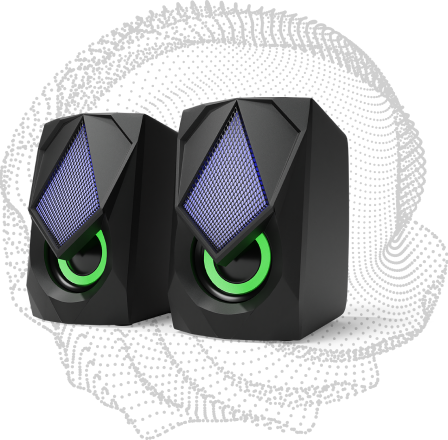
Enhanced Voice Control
The voice control technology for smart home management systems is expected to improve, providing more accuracy and responsiveness. For instance, language processing and machine learning will allow more sophisticated voice commands – providing a more interactive experience for users. You can enjoy a seamless and intuitive voice control experience for your home theater devices.
Integration with Augmented Reality (AR) and Virtual Reality (VR)
In the future, you will be able to bring augmented reality and virtual reality into your home cinema experience. Imagine stepping into a virtual cinema with interactive elements, fully immersing yourself in a new world. You will feel like part of the movie.
Gesture Control and Motion Detection
Much like the Xbox Kinect and Wii technology we have seen in the past, you might see interactive experiences being achieved with motion detection. You can pause, play, or navigate your movie experience using hand gestures and body movements. You won’t need to use a physical remote or voice command.
Artificial Intelligence for Content Recommendation
In the future, we can expect to see more accurate content recommendations powered by AI. Based on your browsing habits, viewing habits, preferences, and social trends, the AI tool will develop the perfect recommendations. Discovering new TV shows, movies, games, and entertainment will be effortless with AI.
Smart Acoustics and Spacial Audio
Smart acoustics and spacial audio can help you to automatically adapt your smart sound system to the room it’s in. You can calibrate the sound system for optimal sound distribution, ensuring immersive audio experiences. With this technology, you’ll gain the following benefits for your viewing experience:
- Accuracy – you will hear sounds in the correct positioning.
- Realism – you will feel a realistic sound experience.
- Envelopment – you will feel completely surrounded by sound.
Enhanced Integration with Smart Home Ecosystem
The number of devices you can integrate with your smart home theater system will increase in future years. You can connect your home theater systems with lighting, security, and voice assistance.
With this integration, you can automate voice control and smart home synchronization for completely immersive comfort. Your home theater system will be an instrument to ambiance, a display system for relevant information and reminders, and will display security information.
Energy Efficiency and Sustainability
Sustainability is a key focus for many homeowners, especially given the recent energy crisis. The future of smart home theaters is grounded in sustainability and energy efficiency. There will be more sustainable features such as power-saving modes, automatic standby functions, and intelligent power management (allowing you to power your entertainment system using less energy).
These features will cooperate to lower our energy consumption without sacrificing performance. This will help you to lower your carbon footprint and enjoy a more environmentally friendly home theater setup.
The Challenges and Considerations of Integrating Smart Home Technology with Your Home Theater
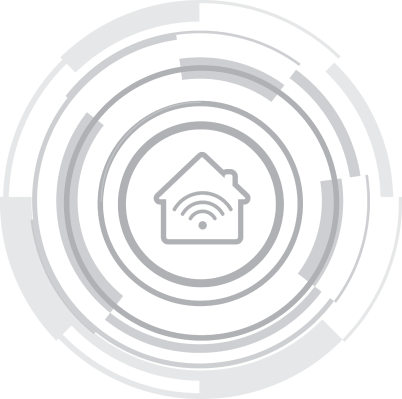
Here are some of the issues you should prepare for:
There are several problems you could encounter when setting up your smart home theater and integrating it with other smart home technologies.
By making these considerations before you begin the integration process, you can cover and prepare for all potential issues for seamless integration. You might even invest in a professional setup for your system to reduce your workload and make the process smoother.
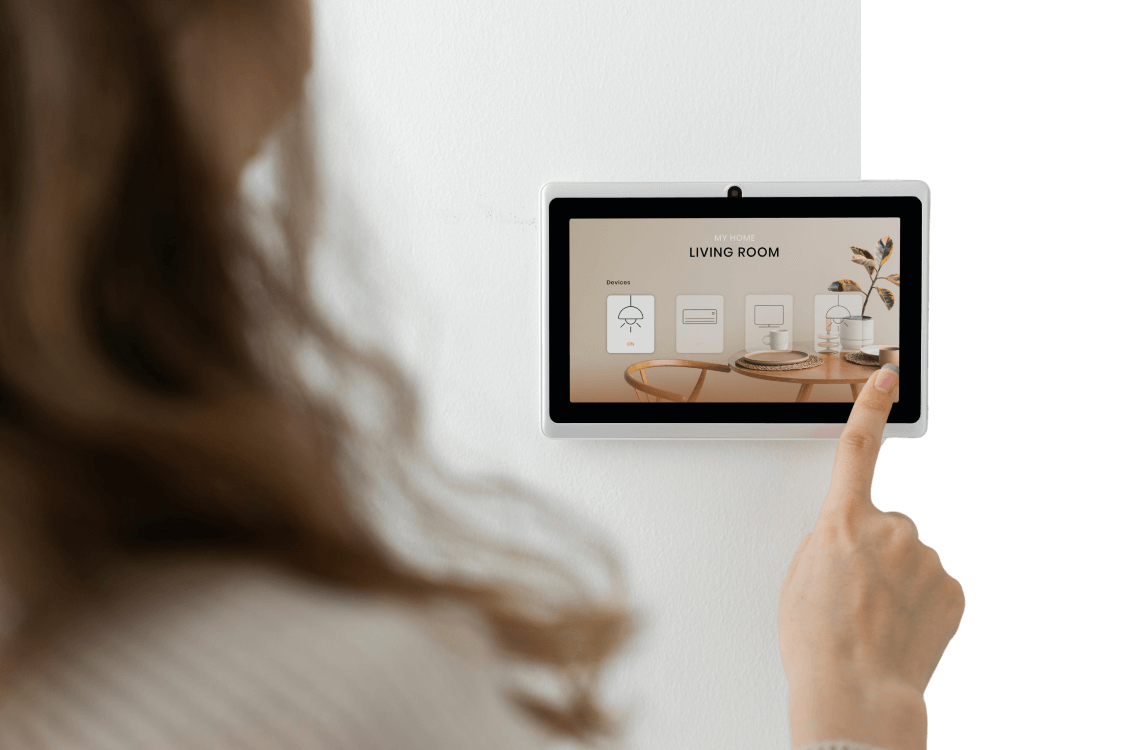
Conclusion
Home entertainment has advanced tenfold with the introduction of smart home technologies. If you are considering investing in a smart home theater, consider the wide range of appliances and smart home devices you can integrate with your system for the ultimate viewing experience.
Of course, privacy, safety, and ease of installation should always be considered a priority during the installation process. Always ensure your smart home system is protected sufficiently and you have a strong internet connection to enable smooth functioning.
What is a smart home entertainment system?
A smart home entertainment system allows you to control and automate your entertainment devices using a central app or device. It integrates technologies like voice control, internet connectivity, and home automation for a convenient experience. You can access and manage your favorite movies, TV shows, and music from various sources. It may also include features like smart lighting and temperature control for a better ambiance while enjoying entertainment.
What is considered smart home technology?
Smart home technology is when different devices and systems in a house are connected to make things easier and more efficient. This includes things like smart thermostats, lighting, security systems, appliances, and voice-controlled assistants. It lets homeowners control and automate things like temperature, lighting, security, and entertainment through connected devices and apps.
What are the examples of smart technology products?
Smart technology products include smart home devices, smart speakers, smart security systems, smart TVs, smartwatches, fitness trackers, smart appliances, smart cars, smart locks, and smart cities.
What is the origin of smart home technology?
Smart home technology originated from the concept of home automation, which emerged in the early 20th century. Automating tasks in homes became popular with the introduction of electrical appliances and systems. However, it was only in the late 20th century, with advancements in computing and networking technologies, that smart home technology started to take shape. The integration of these technologies allowed for the development of interconnected devices and systems that could be controlled and monitored remotely, leading to the birth of modern smart home technology.
What are the advantages of a smart home theater?
- A smart home theater is convenient and easy to use. It allows you to control all your devices from one app or remote, eliminating the need for multiple remotes and making it simple to operate.
- A smart home theater integrates with other smart devices in your home. You can connect it to voice assistants like Alexa or Google Assistant and control it with your voice. Automation features let you set up routines or schedules for device control based on your preferences or time of day.
- A smart home theater allows you to stream content from popular platforms like Netflix, Hulu, or Spotify, giving you a wide variety of entertainment options.
- A smart home theater offers high-quality audio and visual experiences with advanced technologies like Dolby Atmos and 4K resolution. It makes you feel like you’re in a cinema at home.
- A smart home theater adds value to your property by making it more attractive to potential buyers and potentially increasing its resale value.
- Smart home theaters offer convenience, integration with other devices, access to diverse content, superior audio and visual quality, and potential property value addition.
What are the different types of smart home entertainment?
There are several different types of smart home entertainment options available. Some popular examples include smart TVs, which allow users to stream content from various platforms and control their TV using voice commands or mobile apps. Another option is smart speakers, such as Amazon Echo or Google Home, which can play music, answer questions, and control other smart devices in the home. Smart soundbars and home theater systems offer enhanced audio experiences, while smart projectors allow users to create a home theater experience. Additionally, gaming consoles like PlayStation or Xbox can also be integrated into a smart home setup for gaming and multimedia entertainment.
What is the newest smart technology in the home-theater domain?
The latest smart home theater technology includes voice control, artificial intelligence, personalized recommendations, and seamless integration with other smart devices for an immersive entertainment experience.
What to look for in smart home technology?
- When choosing smart home technology, consider compatibility with existing devices and systems. Ensure seamless integration with smartphones, voice assistants, and security systems.
- Consider the features and capabilities of smart home technology. Different systems offer different functionalities like home security, energy management, and entertainment control. Assess your needs and prioritize the features that suit your lifestyle and preferences.
- When choosing smart home technology, prioritize reliability and user-friendliness. Check customer reviews and seek recommendations for a proven track record.
- Check the security of the smart home technology. Make sure it has strong encryption and authentication protocols to protect your data and privacy.
- Consider the cost of the smart home technology, including initial investment and ongoing fees. Find a balance between features, quality, and budget.
